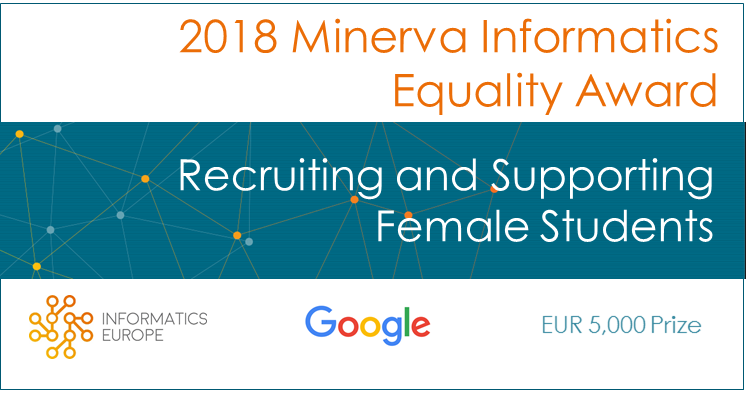
Informatics Europe proudly announces the third Minerva Informatics Equality Award devoted to initiatives which seek to encourage and support the careers of women in Informatics research and education. The third of this annual award will be presented in October 2018 and is sponsored by Google.
The Informatics Europe Minerva Informatics Equality Award recognizes best practices in Departments or Faculties of European Universities or Research Institutes and Labs that have been demonstrated to have a positive impact for women. On a three-year cycle the award will focus each year on a different stage of the career pipeline:
- Developing the careers of female faculty, including retention and promotion;
- Supporting the transition of female PhD and postdoctoral researchers into faculty positions;
- Encouraging female students to enrol in Computer Science/Informatics programmes and retaining them.
The 2018 Award is devoted to initiatives encouraging female students to enrol in Computer Science/Informatics programmes and retaining them.
The Award seeks to celebrate successful initiatives that have had a measurable impact on the recruitment and support of female students within the institution. Such initiatives can serve as exemplars of best practices within the community, with the potential to be widely adopted by other Institutions.
For 2018 examples of impact could include fostering gender balance in all aspects of students’ education, better admission, recruitment and graduation rates for female students, better gender ratio of students receiving stipends, scholarships and other financial support, improved curriculum, designed based on gender analysis, as recorded in objective surveys of staff and student experience, etc.
The Award carries a prize of EUR 5,000.
The Award will be given to a Department or Faculty to be used for further work on enforcing the recruitment and support of female students. To be eligible, nominated institutions must be located in one of the member or candidate member countries of the Council of Europe, or Israel. Institutions associated with members of the Informatics Europe Board and of the Award panel are not eligible. For organizations with more than one Department or Institute, applications coming only from the Department or the Institute with which an evaluation panel member or an Informatics Europe Board member is affiliated will not be considered.
The Award panel will review and evaluate each proposal. It reserves the right to split the prize between different applications. Moreover, noteworthy runners up may also be included as exemplars of best practice in future Informatics Europe publications.
The proposal should include:
- Contact information for the Head of the nominated Department or Faculty and the nominator (who can be the same);
- A brief summary or abstract (100 words or less) which can be made public;
- Description of the initiative (max 2 pages);
- Evidence of its impact (max 2 pages);
- An optional reference list (which may include URLs of supporting material);
- Optionally, one or two letters of support. The letters of support may come, for example, from female staff members who have benefited from the scheme;
- An indication of whether the nomination can be considered as a runner up (if it does not win the award) and be included as an exemplar of best practice in future Informatics Europe publications.
Deadlines:
- Full submissions: June 1, 2018
- Notification of winner(s): August 1, 2018
The Award will be presented at the 14th European Computer Science Summit, in Gothenburg (Sweden), October 8-10, 2018, where a representative of the winning institution(s) will be invited to give a talk on their achievements.
Award Panel:
- Panagiota Fatourou, Foundation for Research and Technology-Hellas (FORTH) and University of Crete, Greece (Chair)
- Liliana Cucu, INRIA, France
- Susan Eisenbach, Imperial College London, UK
- Rachid Guerraoui, EPFL, Switzerland
- Patricia Lago, Vrije Universiteit Amsterdam, The Netherlands
- Kurt Mehlhorn, Max-Planck-Institut für Informatik, Germany
- Dana Petcu, West University of Timisoara, Romania
- Assaf Schuster, Technion, Israel
Further inquiries:

 Netlogica
Netlogica